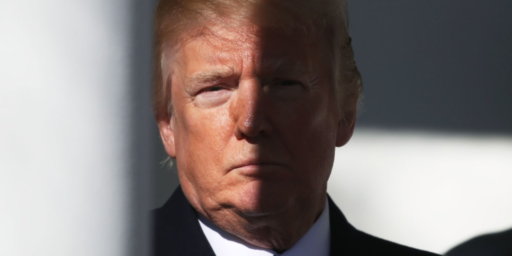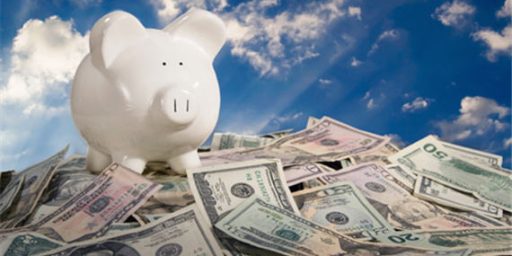Andrew Samwick’s New Year’s Plea
Please stop President Bush from claiming that the increases in tax revenues is due to the tax cuts.
To anyone in the Administration who may read this blog, I have one small wish for the new year. Please stop your boss from writing or saying the following:
It is also a fact that our tax cuts have fueled robust economic growth and record revenues.
This is exactly right. There is no economist that has worked for the Bush Administration that has supported this view. Brendan Nyhan has compiled a list of such economists and so far the results have been unanimous, the tax cuts have not brought in more revenue than they have cost. The list includes,
- N. Gregory Mankiw,
- Ed Lazear,
- Robert Carroll,
- Alan D. Viard.
All have worked in the Bush Administration and all hold the same view, that the tax cuts didn’t pay for themselves. Yes, revenues have increased, but that doesn’t necessarily mean that the increase is due to the tax cuts. There is also increased economic activity which is the norm after a recession. Did the tax cuts help keep the recession short/shallow? Probably. Did it help with the recovery? Probably. But would the economy not have recovered without the tax cuts? That is a highly unlikely proposition considering that the Fed also cut interest rates as well and by quite a bit.




I’m no economist…but yeah, the tax cuts alone didn’t spur all the economic activity. We can’t dismiss the ridiculous increase in government spending. Which, to my understanding, is part of the same side of the fiscal equation. Considering all the money thrown into the economy by the GOP we ought to see a surplus. So where is it? 🙂
The thing the boss isn’t suppose to say is true. I guess you could object to the adjective “fueled”, but growth has been robust and revenues are at a record. The tax cuts contributed to the economic growth.
We don’t have a surplus because congress spends too much. If they had held spending to an inflation adjusted basis since 2000 we would be in surplus. The reason we had surpluses in the 1990’s is because domestic spending was reasonable by today’s standard, but more importantly we dramatically cut back on defense and capital gains rolled in from bogus dot coms and highly inflated legitimate companies.
C. Wegner,
I’m sorry those are just standard GOP talking points, IMO. Where the U.S. in terms of taxes (federal) is a point where minor changes here and there don’t seem to have huge effects on economic activity. I know you wont believe me, but try a well known expert like Joel Slemrod. Were the taxes stimulative? Sure. Do we have record revenues because of them? No. First lets discount things like inflation. Then we have to factor in economic growth as well. Over time the economy tends to grow, now part of that process is taxes, but it is only one part. Backing out all these things is at first necessary.
There is not any one item that by itself either generated economic growth or increased the tax revenues. However, there is historic evidence that cutting taxes is a major factor of economic growth (which is logical when you think about it) and this in turn generates the higher tax revenue.
I always find the concept of a “cost” associated with tax cuts as totally ludicrous. These brilliant economists seem to think that if the taxes had not been cut, the revenues would be even higher. But that in turn assumes that the economic growth would have been as great and thre is no evidence to support that. Anyone who wants to understand economics should be required to study Newtonian physics, with specific emphasis on his law “for every action there is an equal and oposite reaction”. But then I suppose this would be beneath their dignity.
The term “fueled” means contributed or help start in this context. If you “fuel” a debate or discussion you merely add to it, you are not completely responsible for it.
Now, given that A) economic activity has increased and B) tax cuts shortened the recession and C) tax cuts probably helped with the recovery, couldn’t we conclude that tax cuts helped create a robust economy and increase revenues? It seems a reasonable claim and certainly acceptable in the world of political puffery. So why make such a big deal out of it?
Steve,
I would never argue that you can look at one thing in isolation when speaking about macro-economics. I would say that one thing is certain and that is that lower taxes result in faster growth. You can certainly find extreme cases in a theoretical world where that doesn’t hold, but not in reasonable scenarios in which we live.
Joel Slemrod is a bright guy, but to my knowledge has no private sector experience. I had the fortune to have Franco Modigliani as an academic adviser. He was one of the smartest people I have ever known, but he could never see the difference between the efficiency of money spent in the private versus public sector. To him (and his equations) there was no difference.
That depends. When Reagan cut the top marignal rates and closed loop holes there were some pretty big changes, but even then the tax cuts did not “pay for themselves” or result in surging tax revenue oave and above things like recovering from a recession.
Uhhhmmnn, yeah. I don’t see what is so hard about this. Do you really think that the economy woulldn’t have recovered from the recession? That growth wouldn’t have picked up? Especially with the massive drop in interest rates?
Considering that the additional revenues/growth people like Mankiw have suggested are the result of the tax cuts the answer is okay, yeah it would have been slightly lower, but it would have still generated more revenue if the taxes hadn’t been cut.
Actually because economics is not physics why waste one’s time? For example, if the government puts a $1 tax on say DVDs will the price of DVDs go up by $1? No. Since the Demand curve is downward sloping the tax will be born by both the firm and the consumer. Further, with every tax there is a deadweight loss where some of the benefits of trade simply vanish. So, your analogy isn’t very good.
Okay here it is laid out in simple terms. Suppose with the tax cuts the economy grew at say 3.5% and without them it would grow at 3.35%, now factor in that with the lower growth you also have higher taxes you could very easily end up with even more money than we have now. Further, in looking at these “records” we have to take into account things like inflation, by not factoring in things like inflation is how people get to the claims of record oil prices and record (budget) deficits.
Nice, an ad hominem and guilt by association. By the way, since you had Modigliani as an advisor, perhaps you can explain efficiency of money spent? I can think of a number of ways of interpreting that, but I don’t see many of them helping out with the issue of GDP.
Tax cuts were politically necessary both to mollify Bush’s base and as insurance against the attacks that would have come had Bush not done something in response to the economic downturn that was already underway when he assumed office. In my view they were the wrong tax cuts. The problem was that businesses were under-investing not that individuals were under-consuming and those particular tax cuts didn’t do a great deal to change that.
I think the economists are asking the wrong question. Rather than asking “did the tax cuts pay for themselves?” they should be asking “given the political necessity of tax cuts, what kind of tax cuts should there have been?”